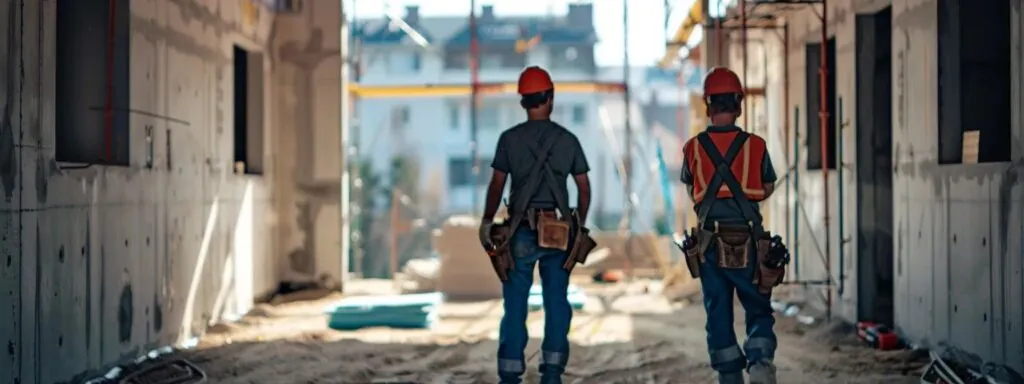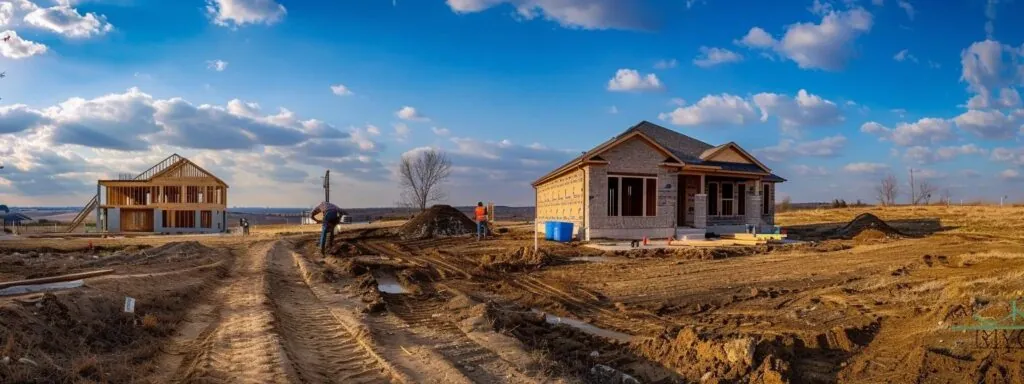In construction, “builder” and “contractor” refer to different roles with distinct responsibilities. A builder focuses on the actual construction of buildings, managing the day-to-day work, and handling tasks like framing and finishing. In contrast, a contractor, often a general contractor, oversees the entire project, coordinating between various subcontractors and ensuring that the work meets the project’s specifications and schedule.
Understanding these differences is crucial for effectively managing a construction project. Let’s jump into the nuances of these roles and see how each can impact your renovation project and why both roles may be critical for a successful project!
Key Takeaway
● Builders handle hands-on construction tasks, such as framing and finishing, while contractors oversee project management, including coordinating subcontractors and securing permits.
● Both roles overlap, with builders focusing on physical work and contractors managing logistics, ensuring projects meet design, safety, and quality standards.
● Builders are ideal for smaller, detailed projects requiring craftsmanship, while contractors are suited for larger, complex projects needing coordination across multiple trades.
● Project scope, size, and complexity influence whether a builder or contractor is more appropriate for the job.
● Personal preferences in project management—hands-on vs. comprehensive oversight—can guide the decision between a builder and contractor.
I. What Is the Difference Between Builders and Contractors?

When discussing builder vs. contractor, it is easy to get confused if you are unfamiliar with the construction industry. However, understanding their distinct roles is crucial for any building project. Here are some key points to keep in mind when comparing these two job titles:
A. Key Responsibilities of Builders
Builders are responsible for the hands-on execution of construction projects. Their duties include constructing the building framework, installing materials, and completing finishing touches such as painting and flooring. Builders work directly with blueprints and plans to ensure the construction meets design specifications. They focus on practical construction tasks, ensuring the work is accurate, safe, and adheres to aesthetic and functional requirements. Their role is critical in turning architectural designs into physical structures.
B. Key Responsibilities of Contractors
Contractors manage the entire construction process from start to finish. When comparing general contractors vs. building contractors, it’s essential to understand their distinct roles. General contractors handle administrative responsibilities, including securing permits, hiring subcontractors, and managing material purchases. They oversee various trades, ensuring the project stays on schedule and within budget while serving as the primary contact for clients, architects, and regulatory bodies.
II. How Do Builders and Contractors Overlap?

Builders and contractors have distinct roles, but their responsibilities often overlap to ensure construction projects succeed. Both professions involve leading teams and coordinating tasks to meet project goals and timelines. They utilize their shared construction knowledge to address problems and ensure work aligns with plans and standards. Both focus on quality assurance and adherence to safety protocols, making collaboration essential for smooth project execution and successful outcomes.
A. Shared Leadership and Coordination
Leadership and coordination are essential for completing building projects. Builders and contractors work together to align their teams and resources, ensuring all aspects of the project are appropriately managed. Builders concentrate on physical construction, while contractors handle administrative tasks and logistical coordination. This teamwork ensures that every project phase progresses as planned, from the initial groundwork to the final touches.
B. Common Construction Expertise
Both builders and contractors rely on extensive construction knowledge to tackle project challenges and complete projects to customer satisfaction. This expertise helps ensure safe structures, meet code requirements, and reflect design intentions. Understanding building materials, techniques, and tools is crucial for both roles, allowing them to make informed decisions and effectively communicate about the project’s progress and issues.
C. Quality Assurance in Both Roles
Quality assurance is a crucial focus for both builders and contractors. Builders ensure high standards through precise construction and attention to detail in every aspect, from structure to finishes. Contractors support this by overseeing the entire project, balancing budget constraints with the need for quality materials and skilled labor. Their combined efforts ensure the project meets all safety and quality standards from start to finish.
III. When to Choose a Builder vs. a Contractor

Deciding between a builder and a contractor depends on the project’s specifics. Builders are ideal for projects needing detailed, hands-on work, such as custom homes or intricate renovations. They excel in delivering precise craftsmanship. In contrast, contractors are suited for larger projects involving various trades and subcontractors. They provide overall management and coordination, ensuring all project parts fit smoothly. Understanding these roles helps you select the right professional for your project’s needs.
A. Factors Influencing Your Choice
The project’s scope and complexity influence hiring a builder or a contractor. A builder’s detailed, hands-on approach often benefits small, straightforward projects. Conversely, more extensive projects with many components require a contractor’s broad management skills. Builders are best for specialized tasks needing direct attention, while contractors handle projects with multiple trades and moving parts. Evaluating these factors ensures you choose the proper professional for practical project completion.
B. Ideal Scenarios for Builders
Builders are ideal for projects requiring meticulous detail and hands-on execution. They are well-suited for custom home builds or intricate renovations where specific design elements need precise craftsmanship. Builders manage specialized tasks, such as creating custom features or structural components, ensuring high-quality results. Their direct involvement helps maintain control over the detailed aspects of construction, delivering tailored outcomes that meet the project’s unique requirements.
C. Ideal Scenarios for Contractors
Contractors are best for managing projects with numerous tasks and people. They excel at coordinating various trades and resources, ensuring everything fits together seamlessly. Contractors oversee the big picture and handle day-to-day operations, making them crucial for complex projects involving multiple subcontractors. Their expertise in managing diverse aspects of a project ensures smooth operation and practical completion, making them the ideal choice for extensive and multifaceted projects.
IV. Expert Tips for Selecting the Right Professional

Selecting the right professional involves assessing the project’s complexity and size. Consider whether you need a builder’s detailed craftsmanship or a contractor’s broad management skills. Resource allocation is also essential; builders handle specific tasks, while contractors manage extensive resources. Personal preferences in management style also play a role; some might prefer a builder’s direct involvement, while others may choose a contractor for comprehensive oversight. These factors help guide the decision between builders and contractors.
A. Assessing Project Complexity
Evaluate the project’s complexity to determine whether a builder or contractor is best suited. Projects with intricate designs or specialized systems typically require a builder’s detailed skills. In contrast, projects with multiple interconnected tasks need a contractor’s coordination abilities. Assessing complexity helps identify the right professional who can handle the project’s specific demands, ensuring effective and efficient execution.
B. Considering Resource Allocation
Resource allocation is crucial when choosing between a builder and a contractor. Builders are influential for projects with focused resource needs, requiring detailed attention to specific tasks. Contractors are better for projects with diverse requirements, as they manage and distribute resources across various activities. Evaluating how resources, including time, materials, and workforce, will be allocated helps determine the most suitable professional for the project.
C. Evaluating Project Size
The project’s size often determines whether a builder or contractor is needed. Larger projects with multiple layers and stakeholders benefit from a contractor’s strategic oversight and management skills. More minor projects typically gain from a builder’s personal touch and specialized expertise. Understanding the project’s scale helps select professionals who can best manage its scope and deliver successful results.
D. Personal Preferences in Project Management
Personal preferences for project management style influence the choice between a builder and a contractor. Some clients prefer a builder’s close, hands-on involvement, while others may opt for a contractor’s broader management approach. The relationship and communication style the client prefers can impact satisfaction with the project’s execution. Choosing a professional whose management style meshes well ensures a more collaborative experience.
Conclusion: Builder vs. Contractor – Making the Right Choice
Choosing between a builder and a contractor hinges on understanding their distinct roles. Builders excel in detailed, hands-on work, which is ideal for smaller or highly customized projects where craftsmanship is crucial. Conversely, contractors are suited for larger projects requiring complex coordination. They manage schedules, resources, and communication across multiple teams. Your choice impacts the project’s workflow, resource management, and quality. Aligning the professional’s strengths with your project’s needs is critical to achieving successful, high-quality results. Contact Advanced Builders to get expert advice.
FAQs
1. What is the main difference between a builder and a contractor?
A builder is responsible for the hands-on construction work, while a contractor oversees the entire project, managing subcontractors and logistics.
2. Do builders and contractors work together on the same project?
Yes, builders focus on physical construction tasks, while contractors handle project management. Their collaboration ensures smooth execution and adherence to timelines and quality standards.
3. When should I hire a builder instead of a contractor?
Hire a builder for smaller, detailed projects requiring craftsmanship, such as custom home builds or renovations.
4. When should I hire a contractor?
Contractors are best suited for larger projects that involve multiple trades and complex coordination, ensuring the entire process runs smoothly.
5. How do I decide between a builder and a contractor for my project?
Consider your project’s size, complexity, and your preference for hands-on involvement (builder) versus comprehensive oversight (contractor).







